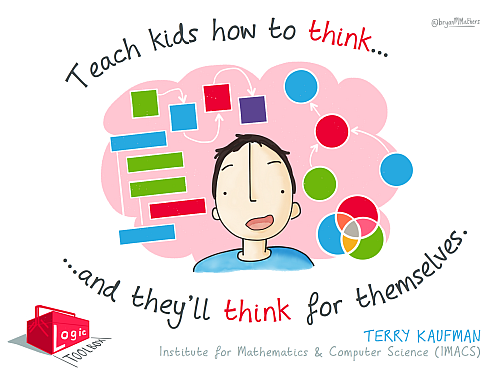
As parents we instinctively want to help our children when they struggle. Our impulse is often to just fix the problem ourselves. While this approach makes sense when children are very young, as they grow it becomes counterproductive. In rescuing our kids, we provide a quick fix but deny them opportunities to practice important skills that they will need to become independent adults.
This is true in general and certainly with respect to education. As children grow, we should encourage them to develop the thinking skills that they will need in college and in their chosen careers. In what may seem like counterintuitive advice, teaching kids to think sometimes involves parents doing less, not more. Here are five tips on how parents can help children learn to think for themselves.
1. Don't be so quick to offer help. If your child asks you for help with school work, first consider how much independent effort she has truly given before turning to you. In a world of online programs that provide hints at the click of a button, it's easy to fall into the trap of thinking that getting to the answer quickly is good and struggling is bad. But math education research shows that a healthy amount of struggle actually leads to deeper learning. By answering your child's questions too soon, you can adversely affect how well she learns. Instead, remind her that it is perfectly normal to take a good amount time to work through problems, allow sufficient time in her schedule to do so, and encourage her to be patient with herself. Once you sense that she has put in a reasonable amount of independent effort on a problem, it's okay to offer hints that give just enough information to get her thinking again without giving away too much.
2. Don't point out mistakes before children have had a chance to discover the mistakes themselves. When you point out mistakes to your child too soon, he is less likely check his own work because he knows you'll do it for him. You also curtail the learning and brain growth that happens when he has to determine on his own that he made an error and what the error is. Finally, you may be signaling that you disapprove of making mistakes, which can lead to other problems such as an unwillingness to try challenging activities. When it's time to bring mistakes to your child's attention, a better way is to let him know that he has made at least one error but not tell him what, where, or how many. This approach necessitates that he will have to look carefully over all of his work and encourages the good habit of doing so on his own as he gets older.
3. Do encourage children to correct their mistakes. Too often, bright students just want to forget about the mistakes they make on school work, especially if they have been led to believe that smart people don't make mistakes. But a mistake means that the problem was challenging for your child, so she should definitely look back at it and work to correct her understanding. Often times we learn better from mistakes than from successes, and research shows that our brains actually grow more from making and correcting mistakes. Help your child see the good in mistakes by using them as opportunities to learn more.
4. Do ask open-ended questions. Asking questions is a highly effective way of guiding your child to think his own way to the answer — What information do you have? What information are you missing that could be helpful? How can you break up the problem into more manageable pieces? When your child was young, he probably asked you a lot of "Why?" questions. As he gets older, turn the tables and ask him why in the same inquisitive, non-judgmental way. Why do you make this assumption? Why do you take that approach? Why does this lead to that? As you know from being on the answering end of "Why?" questions, formulating a thoughtful response takes effort. For a growing mind, that's a good thing. One caveat: Be sure to avoid doing the thinking for your child by giving away too much information in the form of a question such as, "Shouldn't you combine like terms first?"
5. Do provide challenges that require deep thinking. Just as your muscles won't grow from lifting light weights, your child's thinking skills won't develop from doing easy problems. What's more, curious, young minds are naturally engaged by interesting, hard problems as long as those minds are not yet overcome with a fear of making mistakes. Intellectual challenges also provide opportunities to develop good study habits, resiliency from surviving the inevitable mistakes, and genuine confidence that comes from knowing you can handle hard problems.









I remember reading an extensive review of teaching techniques. One of the few that were statistically significant was allowing a 4 second wait time after asking a question. Just like in a conversation, silence, instead of being golden, makes people nervous and want to fill it. The list above validates that research – relax, take your time, and realize that it takes the brain time to think. Thanks for some great ideas.
Steve